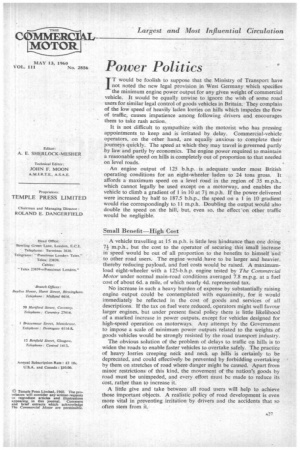Small Benefit—High Cost
Page 29

If you've noticed an error in this article please click here to report it so we can fix it.
A vehicle travelling at 15 m.p.h. is little less hindrance than one doing 71 m.p.h., but the cost to the operator of securing this small increase in speed would be out of all proportion to the benefits to himself 'and to other road users. The engine would have to be larger and heavier, thereby reducing payload, and fuel costs would be raised. A maximumload eight-wheeler with a 125-b.h.p. engine tested by The Commercial Motor under normal main-road conditions averaged 7.8 m.p.g. at a fuel cost of about 6d. a mile, of which nearly 4d, represented tax.
No increase in such a heavy burden of expense by substantially raising engine output could be contemplated with equanimity, for it would immediately be reflected in the cost of goods and services of all descriptions. If the tax on fuel were reduced, operators might well favour larger engines, but under present fiscal policy there is little likelihood of a marked increase in power outputs, except for vehicles designed for high-speed operation on motorways. Any attempt by the Government to impose a scale of minimum power outputs related to the weights of goods vehicles would be strongly resisted by the road transport industry.
The obvious solution of the problem of delays to traffic on hills is to widen the roads to enable faster vehicles to overtake safely. The practice of heavy lorries creeping neck and neck up hills is certainly to be deprecated, and could effectively be prevented by forbidding overtaking by them on stretches of road where danger might be caused. Apart from minor restrictions of this kind, the movement of the nation's goods by road must be unimpeded, and every effort must be made to reduce its cost, rather than to increase it.
A little give and take between all road users will help to achieve those important objects. A realistic policy of road development is even more vital in preventing irritation by drivers and the accidents that so often stem from it.




































































































